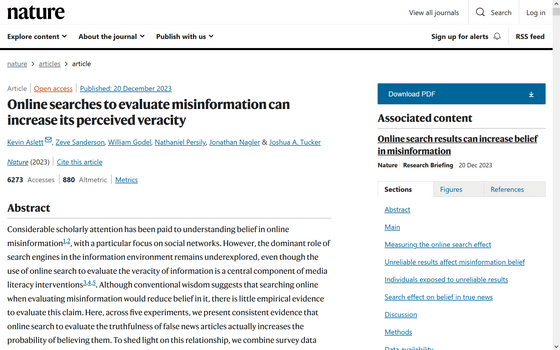Research results show that searching to check the authenticity of false information may lead to believing in the false information instead

In order to confirm the authenticity of misinformation and fake news, it is important to do your own detailed research on the source of the information. On the other hand, people who promote conspiracy theories and ideologies also frequently repeat phrases such as 'investigate yourself.' Political scientists have revealed that researching information yourself may lead to believing in misinformation and conspiracy theories.
New Research Suggests Online Search Can Increase Belief in Misinformation | TechPolicy.Press

How Search Engines Boost Misinformation | Scientific American
Kevin Alette of the University of Central Florida and others ↓
We conducted multiple experiments in which we asked thousands of participants to classify timely news articles as 'true,' 'false,' or 'obscure.' In the experiment, the experimental group was encouraged to use a search engine such as Google for classification, and the control group was not informed. The resulting classification was evaluated by six professional fact checkers.
As a result, the experimental group who were encouraged to search online were approximately 20% more likely to classify false or misleading information as true. This pattern is the same even for frequently reported cases such as the new coronavirus infection, and even if the information is known to a certain extent, the judgment of its authenticity can be swayed by searching. It became clear.
The reason for this may be that search engines are displaying misleading information sources. When Alette and his colleagues further analyzed the search terms and results searched by the experimental group, they found that approximately one-third of the experimental group had been exposed to false information, resulting in a 20% increase in search results. It is possible that it was connected to.

As an example, an article given to the subjects included the following: ``COVID-19 lockdowns and vaccination mandates could lead to widespread hunger and insecurity this winter. Facing a Conspiracy.” When the experimental group tried to categorize this by searching for the term ``engineered starvation'', unreliable sources appeared in about 63% of the search results. On the other hand, when the word ``set up'' was excluded, no false information was displayed.
From this, it was concluded that when people search to check the truth of misinformation or conspiracy theories, they end up believing the information. ``This study highlights the need for search engines to invest in solving problems,'' Alette et al. said.

Some have pointed out that the study did not give all participants the option to decide whether to search or not, and that people might have acted differently if they had been given the option.
When asked about the issue of incorrect information being included in search results, Google said, ``We emphasize quality and design systems that prevent people from being exposed to harmful or misleading information.'' is.
Related Posts:
in Posted by log1p_kr







